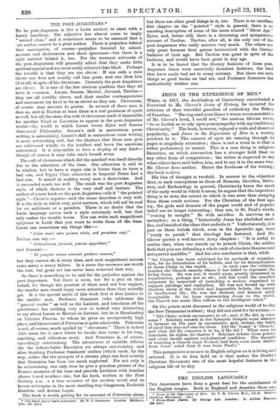JESUS IN THE EXPERIENCE OF MEN.*
Wwene, in 1917, the Archbishop of Canterbury contributed a Foreword to Mr. Glover's Jesus of History, he incurred the
criticism of that watchful guardian of orthodoxy the Bishop of Zanzibar. " Having read your Grace's warm recommendation of Mr. Glover's book, I could not," the zealous African wrote, "be so foolish as to rely upon yoursympathy with my traditional
Christianity." The book, however, enjoyed a wide and deserved popularity, and Jesus in the Experience of Men is a worthy
pendant to it. The current of open air running through its pages is singularly attractive ; there is not a word in it that is either perfunctory or unreal. This is a rare thing in religious literature, on which convention has a stronger hold than on any other form of composition ; the writer is expected to say what others have said before him, and to say it in the same way. Mr. Glover does neither. Hence the freshness of his writing; the book is alive.
His line of thought is twofold. In answer to the objection that, in such conceptions as those of Demons, Sacrifice, Salva-
tion, and Eschatology in general, Christianity bears the mark of the early world in which it arose, he argues that the important thing is to note the extent to which it was even then escaping from those crude notions. For the Christian of the first age, e.g., the gods and demons of the pagan world and of popular belief are no longer interesting ; they are, in St. Paul's words,
"coming to naught." So with sacrifice. It survives as a metaphor ; as a thing, "historically Jesus has abolished sacri- fice, and banished the ideas that underlie it." Unfortunately, it is just on these beliefs which, even in the Apostolic age, were " ready to perish " that theology has fastened. And Mr. Glover quotes a well-known Army chaplain " It is awful to realize that, when one stands up to preach Christ, the soldier feels that you are defending a whole ruck of obsolete theories and antiquated muddles." And his own conclusion is that, while
" the Church has been criticized for its methods of organiza- tion, for its formulation of its beliefs, and for its interpretation of Jesus Christ to the world, . . . in each case the criticism touches the Church exactly where it has failed to represent the living Jesus. He was not, it would seem, greatly interested in organization, perhaps not at all ; still less could the crucified carpenter be suspected of launching a society organized to support privilege and capitalism. He was not bound up with obsolete views of the world and impossible beliefs, the enemy of intellectual life ; He was the freshest and keenest spirit imaginable. So far from representing Jesus to the world, the Church has made Him odious to the intelligent mind."
On the points most discussed in the religious world of to-day the New Testament is silent ; they did not exist for its writers :--
" Did Christ ordain sacraments at all ; and, if He did, in what sense ? Scholars remark in the Synoptic Gospels some absence of interest on His part in sacraments. and, indeed, the habit of mind that does not care for them. Did He ` found ' a ` Church,' and what did He conceive it to be, if He did 7 What were its functions, its rights, its charter ? Scholars debate these points, and often decide against ecclesiastical tradition. The thought of founding a Church (says Weinel) had been even more absent from Jesus' mind than it was from Paul's."
This perspective is as new in English religion as it is living and rational. It is its firm hold on it that makes the Student Christian Movement one of the most hopeful features in the religious life of to-day.


































 Previous page
Previous page